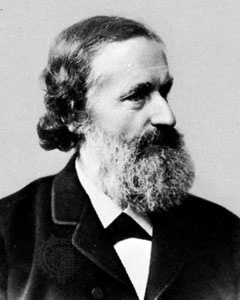Kirchhoff, Gustav Robert
German physicist
born March 12, 1824, Königsberg, Prussia 【now Kaliningrad, Russia】
died Oct. 17, 1887, Berlin, Ger.
 German physicist who, with the chemist Robert Bunsen, firmly established the theory of spectrum analysis (a technique for chemical analysis by analyzing the light emitted by a heated material), which Kirchhoff applied to determine the composition of the Sun.
German physicist who, with the chemist Robert Bunsen, firmly established the theory of spectrum analysis (a technique for chemical analysis by analyzing the light emitted by a heated material), which Kirchhoff applied to determine the composition of the Sun.In 1845 Kirchhoff first announced Kirchhoff's laws, which allow calculation of the currents, voltages, and resistances of electrical networks. Extending the theory of the German physicist Georg Simon Ohm, he generalized the equations describing current flow to the case of electrical conductors in three dimensions. In further studies he demonstrated that current flows through a conductor at the speed of light.
In 1847 Kirchhoff became Privatdozent (unsalaried lecturer) at the University of Berlin and three years later accepted the post of extraordinary professor of physics at the University of Breslau. In 1854 he was appointed professor of physics at the University of Heidelberg, where he joined forces with Bunsen and founded spectrum analysis. They demonstrated that every element gives off a characteristic coloured light when heated to incandescence. This light, when separated by a prism, has a pattern of individual wavelengths specific for each element. Applying this new research tool, they discovered two new elements, cesium (1860) and rubidium (1861).
Kirchhoff went further to apply spectrum analysis to study the composition of the Sun. He found that when light passes through a gas, the gas absorbs those wavelengths that it would emit if heated. He used this principle to explain the numerous dark lines (Fraunhofer lines) in the Sun's spectrum. That discovery marked the beginning of a new era in astronomy.
In 1875 Kirchhoff was appointed to the chair of mathematical physics at the University of Berlin. Most notable of his published works are Vorlesungen über mathematische Physik (4 vol., 1876–94; “Lectures on Mathematical Physics”) and Gesammelte Abhandlungen (1882; supplement, 1891; “Collected Essays”).
- King John
- King Khālid Military City
- King Lear
- King Leopold Ranges
- kinglet
- Kingman
- Kingman Brewster, Jr.
- Kingman, Jr. Brewster
- Kingman Reef
- King, Martin Luther, Jr.
- King Oliver
- Kingo, Thomas
- King Philip's War
- King Ranch
- King, Rufus
- Kings and queens regnant of Spain
- Kings, books of
- Kings Canyon National Park
- Kings County
- king's evil
- Kingsford Smith, Sir Charles Edward
- Kingsley, Charles
- Kingsley Davis
- Kingsley, Henry
- Kingsley, Mary Henrietta